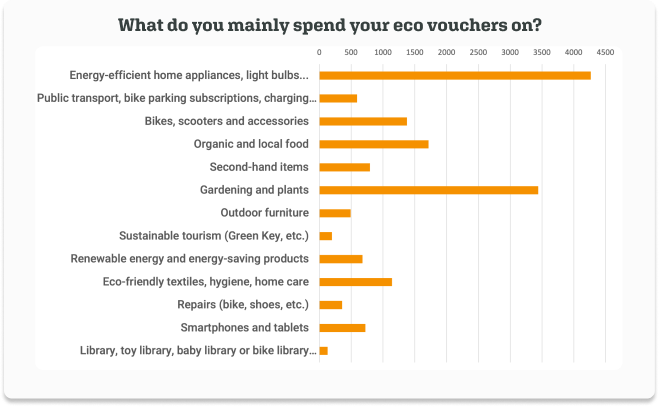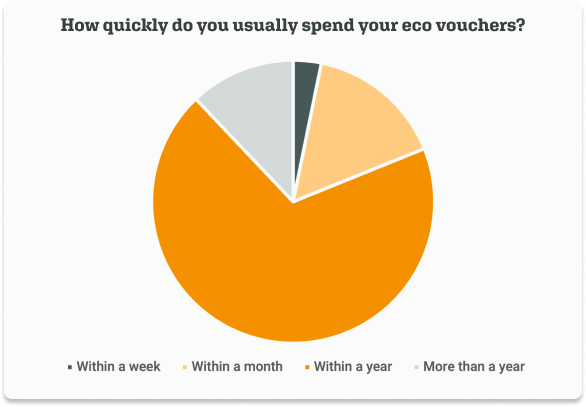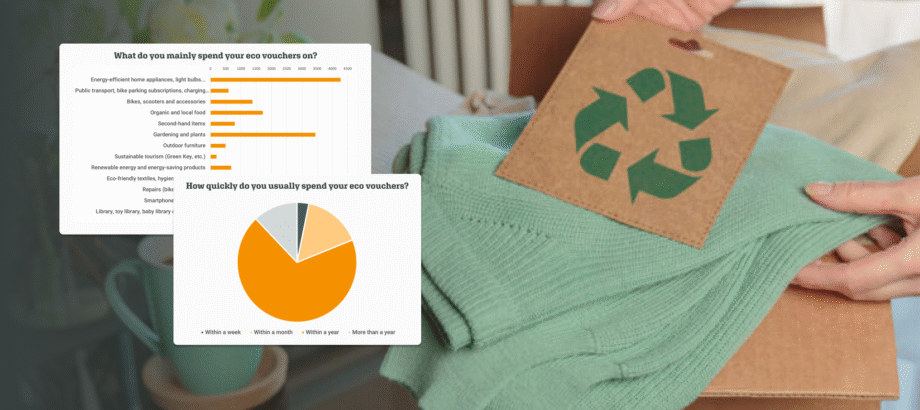This summer, we conducted a survey among Monizze eco voucher beneficiaries. Nearly 10,000 people shared how they use this sustainable budget in their daily lives.
The results are clear: Belgians love their eco vouchers, and they made sure we knew it.
From energy-efficient appliances and organic food to plants and sustainable mobility, eco vouchers have become an essential extra in Belgians’ wallets.
A large-scale survey
At Monizze, we wanted to understand how eco vouchers actually improve the lives of our beneficiaries. That’s why we launched a survey this summer among our community.
The success exceeded all expectations: close to 10,000 respondents took part. A figure that reflects both user engagement and the importance of this benefit in their daily lives.
“I wish I had eco vouchers more often! It’s the easiest way to eat fresh an good quality food.” (César)
“Travelling by train and eat organic is my favourite way to spend echocheques.” (Alessandra)
“I usually spend my eco vouchers on fresh organic food and bike maintenance. Great way to support healthy living!” (Mia)
How do Belgians use their eco vouchers?
The survey shows a wide variety of uses. Yet one common thread stands out: eco vouchers help Belgians consume more sustainably, encouraging choices they might not have made without this budget.
1. Energy-efficient home appliances
The most frequently mentioned category remains household appliances. Many beneficiaries use their eco vouchers to replace a device with a more energy-efficient one, often of higher quality than what they could otherwise afford.
“I like to save and use them for eco friendly electronics. This year I bought a tv. It was really nice because I bought a better and a more energy efficient model than I would normally get.”
2. Gardening and plants
The second major spending category is the garden. For many, it has become a spring tradition: eco vouchers are essential for preparing the vegetable patch, buying plants, or investing in durable equipment.
“I love to spend my ecocheques on plant pots. I wait all year for the eco cheque and then go crazy buying plants and pots. Thank you!” (Kaylee)
3. Organic food
Since organic food has been added to the list of authorized eco voucher purchases, it has quickly become a major category of spending.
Once again, respondents point out that this extra budget allows them to buy organic and higher-quality products they might not otherwise have purchased.
“I love using my eco vouchers to buy organic fruits and vegetables at my local market.” (Sudesh)
“Spending them on eco and bio groceries to reduce my carbon footprint and eat healthier food.” (Ignacio)
“I wish I had eco vouchers more often! It’s the easiest way to eat fresh an good quality food.” (César)
4. Bikes and accessories
Another rapidly growing use: everything related to cycling. Eco vouchers are massively used to invest in a (electric) bike, cover repair costs, or purchase accessories.
Whether it’s to treat yourself, invest in higher-quality equipment, buy bikes for the family, or finally leave the car behind, the eco voucher gives your budget a real boost.
“When my e-bike was stolen I needed to buy a new one asap, the eco vouchers cushioned the blow to my finances just when I needed it.” (Marcus)
“I am a big bike-packing fan as I love slow travelling. The Monizze Eco vouchers help me upgrade my bikepack set-up every year!” (Estelle)
“I like to spend my eco vouchers to buy accessories that allow me to use my bike more for transportation (or also to do bike maintenance).” (Alaa)

How fast do Belgians spend their eco vouchers?
Our beneficiaries don’t let their eco vouchers sit unused. 88% spend them within the first year, of which 19% already do so within the first month.
These figures show that eco vouchers are perceived as an immediate and useful benefit.
Their fast and easy use can be explained by a combination of factors:
- Monizze eco vouchers have always been digital: available on the same card as meal and gift vouchers
- The acceptance network is expanding rapidly, both online and in-store
- The list of authorized uses is regularly broadened to match Belgians’ evolving needs and consumption habits

What beneficiaries say about their eco vouchers
Behind the statistics are personal stories.
Respondents shared how eco vouchers allow them to combine purchasing power with sustainable choices.
“I try to use my eco vouchers to invest in greener habits, from filling my basket with fresh, local produce to support nearby farmers to picking up energy-saving, repairable tools for my DIY projects. Small actions can make a big difference for our beautiful Earth, and it feels good knowing that almost every euro on my Monizze card helps create a healthier planet.” (Pinar)
“I have been living in Belgium since 2020 and receive eco vouchers every year. I’m happy to use them for repairing my e-scooter and buying organic products from grocery stores. These vouchers are helpful, as they encourage me to focus on renewable resources and purchase more eco-friendly products.” (Anupama)
These testimonials show that eco vouchers are a powerful tool. Beyond providing additional budget and essential purchasing power, they are a lever for responsible consumption.
A benefit that goes beyond everyday life
The results of our consumption survey fit into a broader economic context: eco vouchers are already used by 2.3 million employees in Belgium.
They contribute to:
- Sustainability: €1 spent in eco vouchers = 1 kg CO2 saved (Listen – VIA study)
- Local economy: €346 million issued in 2024, generating more than €620 million in economic impact
- Purchasing power: up to €23 million in collective savings on energy bills thanks to the purchase of more efficient appliances
In short: the figures confirm what our beneficiaries tell us.
A strategic tool for employers
Eco vouchers are far more than a “nice-to-have”, they are also a strategic HR tool:
- Tax-advantaged (exempt from taxes and social contributions)
- Aligned with ESG objectives
- 100% digital and easy to manage
Eco vouchers therefore support sustainable purchasing power while keeping company costs under control.
The eco voucher: a lever for sustainability and purchasing power
Our survey and sector data are aligned: Belgians are attached to their eco vouchers, and they know how to make the most of them.
For beneficiaries, employers, and merchants, eco vouchers combine economic, social, and environmental impact.
So instead of questioning this benefit, shouldn’t we finally recognize it for what it truly is: a strategic lever for purchasing power and sustainability?


